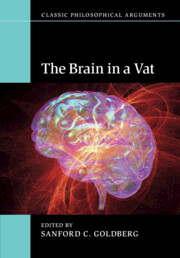Book contents
- Frontmatter
- Contents
- List of contributors
- Acknowledgments
- 1 Introduction: Putnam's reflections on the brain in a vat
- Part I Intentionality and the philosophy of mind and language
- Part II Epistemology
- 6 Putnam on BIVs and radical skepticism
- 7 New lessons from old demons: the case for reliabilism
- 8 BIVs, sensitivity, discrimination, and relevant alternatives
- Part III Metaphysics
- Bibliography
- Index
7 - New lessons from old demons: the case for reliabilism
from Part II - Epistemology
Published online by Cambridge University Press: 05 June 2016
- Frontmatter
- Contents
- List of contributors
- Acknowledgments
- 1 Introduction: Putnam's reflections on the brain in a vat
- Part I Intentionality and the philosophy of mind and language
- Part II Epistemology
- 6 Putnam on BIVs and radical skepticism
- 7 New lessons from old demons: the case for reliabilism
- 8 BIVs, sensitivity, discrimination, and relevant alternatives
- Part III Metaphysics
- Bibliography
- Index
Summary
Our basic view of the world is well supported. We do not simply happen to have this view but are also equipped with what seem to us very good reasons for endorsing it. But it still seems possible that the real world is in fact very different from the way it epistemically appears to us, even if the way it appears to us is informed by our best epistemic sources (including the sciences). One radical way of considering the world as being very different from the way it appears to us is to think of our cognitive perspectives as being manipulated by a powerful being, traditionally called “the Evil Demon,” who intends to deceive us about almost everything in the world. Nothing much depends on what exactly we think about the nature, motivation, and mode of operation of this demon, for example, whether we conceive of it as an evil god (as Descartes suggested), as a mad scientist (as in Putnam's seminal brain-in-a-vat case), or as a giant machine (as in the movie The Matrix). If some kind of Evil Demon hypothesis were true of the actual world, our well-established view of the world would be massively mistaken.
What is the epistemic significance of the fact that the Evil Demon hypothesis might be true of our world, although we currently don't have any evidence that suggests that this possibility is actualized? There are two rather different intuitive responses that are usually addressed separately. On the one hand, many people share what I will call the Old Evil Demon (OED) intuition, according to which one must be justified in believing that the Evil Demon hypothesis is false in order to have any justified beliefs about the external world. Descartes maintained a similar view with respect to knowledge. In order to know that p, Descartes claimed, one has to rule out all propositions that are incompatible with the truth of p, including the hypothesis of radical demon deception. Currently, BonJour takes such a requirement as obviously applying to epistemic justification: “to admit that no response to the sceptic is possible … destroys the claim of … epistemic justification … in the first place” (BonJour 1985: 14). Although not everyone will share BonJour's intuition, it seems to be accepted by a significant number of epistemologists and non-philosophers.
- Type
- Chapter
- Information
- The Brain in a Vat , pp. 90 - 110Publisher: Cambridge University PressPrint publication year: 2016
- 1
- Cited by

